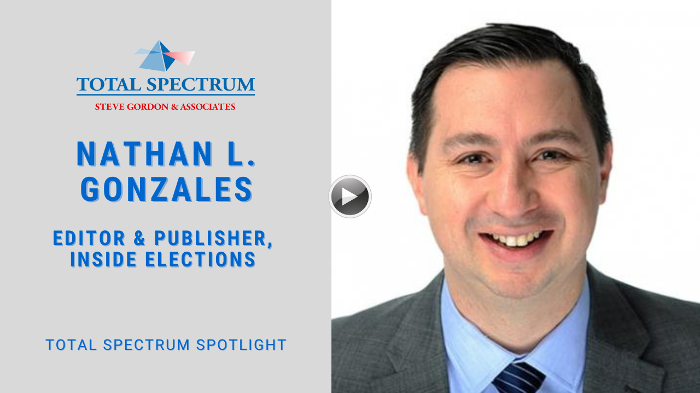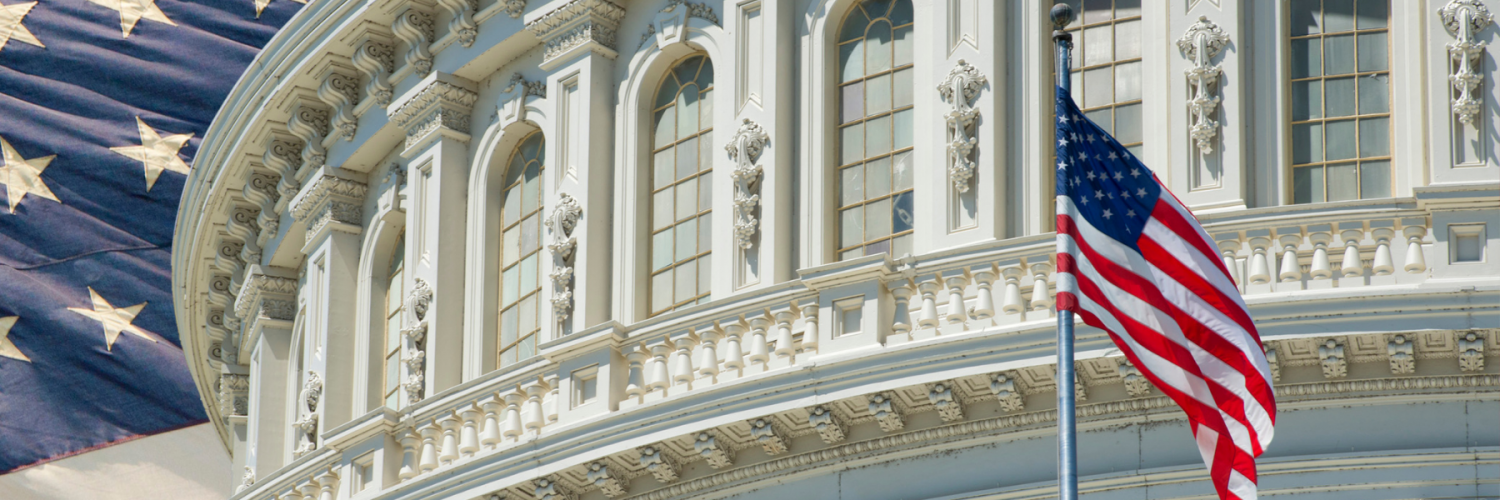Latest news from Washington, D.C. produced by Total Spectrum/SGA exclusively for members of the Arizona Chamber of Commerce & Industry
More Info: Michael DiMaria | Partner and Vice President of Business Development | 602-717-3891 | [email protected]

Thanks for your interest in Washington, D.C., and thanks for reading This Week in Washington.
Special thanks to those who participated in this week’s Arizona Chamber Fly-in. Congressman Erik Paulsenand I enjoyed visiting with each of you who attended. The pandemic robbed members of Congress from interacting with Americans… and the pandemic robbed Americans from interacting with members of Congress and their staff. Thankfully, that’s all in the rearview mirror.
Both the Senate and the House returned to Washington right after Labor Day, and both are scheduled to leave town by the end of September. Patrick Robertson has written an excellent summary of Congress’ legislative agenda – what’s possible in the next 7 days and what is going to get pushed off until the lame duck session. Patrick’s Washington Whispers articles are always good, and this week’s is exceptionally well done.
Ramona Lessen monitored the September 20th hearing of the Senate Banking, Housing, and Urban Affairs Committee, entitled “Tightening the Screws on Russia.”
While Patrick summarized the legislative agenda, the political agenda is also on the front burner, and the water is boiling. Republicans expect to take back the House of Representatives; the question is how many seats they will hold next January. The very conservative low is about 220, and the realistic high is around 230. Minority Leader Kevin McCarthy will present the House Republicans’ ‘Commitment to America’ today in Pittsburgh, which they hope will help them achieve the biggest majority possible in the next Congress.
The Senate is way too close to call. The key states have been – and still are – Arizona, Georgia, North Carolina, Ohio, Nevada, Pennsylvania, and Wisconsin. Republicans had momentum through the spring, but Democrats took some back over the summer. Republicans now sense a slight breeze at their back as inflation, interest rates, and the economy become more impactful. Senate Republicans are beginning to feel cautiously optimistic that they could hold a one or two seat majority next January.
Today’s Total Spectrum Spotlight interview is with Nathan Gonzales, the Editor and Publisher of Inside Elections, which provides nonpartisan analysis of Senate, House, and gubernatorial, and presidential elections. Nathan provides important context and fascinating observations on November’s elections.
Congressman Erik Paulsen has planned a number of really important interviews for our Total Spectrum Spotlight series. The next interview should be distributed next week, and as always, we welcome your thoughts and comments.We’ll be back in two weeks with the next issue of This Week.

Total Spectrum Managing Director
Total Spectrum Spotlight
Labor Day starts the final lap toward the finish line for this year’s elections.
n this week’s Total Spectrum Spotlight, Congressman Erik Paulsen speaks with Nathan Gonzales, Editor and Publisher of Inside Elections, a publication which provides nonpartisan analysis of campaigns for Senate, House, governor and president. Mr. Gonzales also serves as Elections Analyst for CQ Roll Call.
Mr. Gonzales shares his insights on the GOP’s momentum going into November’s midterm election and how the Supreme Court’s Dobbs decision may have changed that momentum. He also explores whether results from special elections should be considered as trend indicators, and which Senate races are surprising analysts – and the potential for another runoff in Georgia
All this and more in today’s Total Spectrum Spotlight.

Washington Whispers
By Patrick Robertson, Total Spectrum Strategic Consultant
Congress returned after Labor Day from its summer break and its to-do list has narrowed as September marches on.
Coming into the month, the Senate had hoped to vote on a bill to codify the right for same-sex couples to marry, pass the annual defense authorization bill, pass a permitting reform bill authored by Senator Joe Manchin (D-WV), and pass a Continuing Resolution (CR) to fund the government beyond the end of Fiscal Year 2022 (FY22), which ends at midnight on September 30.
But since Congress returned, a number of these items have been pushed until after the election or even later. First, Democratic and Republican Senators announced that they would put off a vote on the same sex marriage bill until after the election. The bill negotiators, who include Senators Tammy Baldwin (D-WI) and Susan Collins (R-ME), have been working for months to agree on a product that will get 60 votes in the Senate. This delay will give them more time to find the 60 votes they will surely need to clear the filibuster.
Congress has passed an annual defense authorization bill for the better part of six decades. The Senate has not debated this year’s version, but the House passed a bill with almost 330 votes and defense negotiators have decided to conference a final product that both chambers can pass in a lame duck session following the November election. This strategy has been used in years past and observers expect that the bill will eventually pass.
In exchange for his vote on the Inflation Reduction Act (IRA), Senator Joe Manchin (D-WV) got assurances from Speaker Nancy Pelosi (D-CA) and Senate Majority Leader Chuck Schumer (D-NY) to consider a permitting reform bill that would make it easier to get federal permits for infrastructure projects, especially in the energy sector. This agreement was necessary because the changes Senator Manchin is seeking could not be considered under the Senate’s limited budget reconciliation rules that the Senate used to pass the IRA.
Senator Manchin released his bill this week which proposes these permitting changes:
- A maximum time to consider federal permit requests;
- Concurrent review of permit application by multiple federal agencies;
- A new designation of projects of “strategic national importance” to receive expedited consideration;
- Some shorter timelines for legal challenges to federal permitting actions; and
- Enhance federal government authority over interstate transmission lines.
Leader Schumer and Senator Manchin are working to insert these changes into the extension of government funding because it is a bill that will get 60 votes. They are banking on Republican support for both the funding bill and the permitting reform bill carrying over to make this package pass the Senate. But there are a few warning signs. Senator Shelley Moore Capito (R-WV) has released her own permitting reform bill with 46 Republican Senate cosponsors, which gives those Republicans cover for opposing the Manchin plan if they want to do so. Some Republican Senators are suggesting they could tank the deal as revenge on Democrats who used budget reconciliation to pass their priorities. In addition, 72 House Democrats have said they oppose the Manchin plan. Just yesterday, Sen. Capito announced she will vote in favor of Sen. Manchin’s bill if it is included in the CR.
Finally, in addition to some of the concerns being raised on the left, top House Republican Rep. Kevin McCarthy is currently urging House Republicans to oppose the CR over their concerns on border funding. On Friday, Leader McCarthy will be in Pittsburgh, PA to announce Republicans’ unified message, called “Commitment to America.”
In short, there are a lot of twists and turns remaining in the debate to pass a funding bill before September 30 and the Congress has left a lot of work for itself when it returns after the November midterm elections. Lame duck sessions of Congress go one of two ways – either a lot of bipartisan dealmaking happens or Congress does the bare minimum, sometimes even punting decisions to the new Congress in the new year.
At this point, Congress is banking on having some cooperation in the lame duck but no one can know if that will be true until the political dynamic is set post-election. As a reminder, the 2020 Senate landscape was not clear until January 2021 with runoffs and recounts, so there could be an even more compressed timeline.Most observers predict that Congress will pass a short-term funding bill before September 30 to fund the government until either December 9 or December 16, and then decide if anything else can ride on that bill or if all items will need to wait until after the midterms.
Hearing Report
By Ramona Lessen, Executive Director, Total Spectrum
Senate Banking, Housing and Urban Affairs Committee hearing on “Tightening the Screws on Russia”
Tuesday, September 20, 2022; 9:00 a.m.
To view a livestream of the hearing please click here.
Senator Sherrod Brown (D-OH), Chairman
Senator Patrick J. Toomey (R-PA), Ranking Member
Witnesses:
The Honorable Elizabeth Rosenberg
Assistant Secretary For Terrorist Financing And Financial Crimes
U.S. Department of the Treasury
Mr. Andrew C. Adams
Director, Task Force KleptoCapture
United States Department of Justice
Congressional Calendar
All times ET
Monday, Sept. 19
- 2 p.m. House Rules Committee business meeting to consider a bill, S. 1098, that would authorize federal direct consolidation loan borrowers to separate joint consolidation loans.
Tuesday, Sept. 20
- 9 a.m. Senate Banking Committee hearing on “tightening the screws on Russia,” focusing on smart sanctions, economic statecraft and next steps.
- 9:30 a.m. Senate Armed Services Committee hearing on U.S. nuclear strategy and policy.
- 10 a.m. House Agriculture Conservation and Forestry Subcommittee hearingon a 2022 review of the Farm Bill, with respect to stakeholder perspectives on Title II conservation programs.
- 10 a.m. House Oversight Committee markup of at least five bills, including one that would provide for expanded home rule for the residents of the District of Columbia.
- 10 a.m. House Financial Services Consumer Protection and Financial Institutions Subcommittee hearing on alternative payment systems and the national security impacts of their growth.
- 10 a.m. House Science Committee hearing on ”strengthening science to respond to a rapidly changing Arctic.”
- 10 a.m. House Small Business Committee hearing on the Small Business Administration’s Office of International Trade.
- 10 a.m. House Veterans’ Affairs Oversight and Technology Modernization subcommittees joint hearing on ”VA Major Acquisitions Failures: In Search of Solutions.”
- 10:15 a.m. House Education and Labor Early Childhood, Elementary and Secondary Education Subcommittee hearing on meeting students’ academic, social and emotional needs.
- 11 a.m. House Natural Resources Energy and Mineral Resources Subcommittee hearing on a bill, H.R. 8802, that would require the Interior Department the Forest Service to align management of public lands and waters with the president’s greenhouse gas emission reduction goal.
- 1 p.m. House Natural Resources Indigenous Peoples Subcommittee hearing on “Examining Oklahoma v. Castro-Huerta: The Implications of the Supreme Court’s Ruling on Tribal Sovereignty.”
- 2 p.m. House Agriculture Commodity Exchanges, Energy and Credit Subcommittee hearing on assessing crypto as a tool for financial inclusion.
- 2 p.m. House Financial Services Diversity and Inclusion Subcommittee hearing on a review of diversity and inclusion at America’s largest insurance companies, including on five bills, one of which would require Dodd-Frank-regulated entities to provide information necessary for the Offices of Women and Minority Inclusion to carry out their duties.
- 2 p.m. House Rules Committee business meeting to consider the Presidential Election Reform Act.
- 2:30 p.m. Senate Banking Transportation-HUD Subcommittee hearing on stakeholder perspectives on the USDA’s Rural Housing Service.
- 2:30 p.m. Senate Homeland Security Investigations Subcommittee hearingon how DOJ “failed to implement” the Death in Custody Reporting Act.
- 2:30 p.m. Senate Judiciary Antitrust and Competition Subcommittee hearingon oversight of federal enforcement of antitrust laws.
Wednesday, Sept. 21
- 9:30 a.m. House Oversight National Security Subcommittee hearing on Russia’s use of private military companies.
- 10 a.m. House Financial Services Committee hearing on oversight of the U.S.’ largest consumer-facing banks. The hearing will include testimony on 14 bills, including one that would require the CFPB to create “clear federal oversight” over the development of credit scoring models and testimony from several witnesses, including JPMorgan Chase & Co. Chairman and CEO Jamie Dimon.
- 10 a.m. House Foreign Affairs Middle East, North Africa and Terrorism Subcommittee hearing on U.S. interest in regional security cooperation in the Middle East and North Africa.
- 10 a.m. House Homeland Security Committee hearing on critical infrastructure preparedness and resilience, with a focus on water.
- 10 a.m. House Rules Legislative and Budget Process Subcommittee hearingon legislative and budgetary solutions to unfair restrictions on third-party repair of electronic devices.
- 10 a.m. House Science Space Subcommittee hearing on the next generation of weather satellites.
- 10 a.m. Senate Appropriations Military Construction-VA Subcommittee hearing on an update on rollout, cost and schedule of the VA’s electronic health record modernization efforts.
- 10 a.m. Senate Homeland Security and Governmental Affairs Committee hearing on five nominations, including Colleen Shogan’s nomination to be the archivist of the National Archives.
- 10 a.m. Senate Judiciary Committee hearing on pending nominations.
- 10 a.m. House Judiciary Committee markup of six measures, including a bill that would create a grant program for states to assist their efforts in modernizing criminal justice data infrastructure to facilitate automated record sealing and expungement.
- 10 a.m. House Natural Resources Committee markup of a bill, H.R. 4690, which would reauthorize existing fishery conservation and management laws.
- 10 a.m. House Small Business Committee markup of two measures, including a bill, H.R. 8844, that would reauthorize the Small Business Administration (SBA)’s State Trade Expansion Program, or STEP.
- 10 a.m. Senate Environment and Public Works Committee business meetingto consider eight nominations, including six for the Tennessee Valley Authority board of directors, and five General Services Administration resolutions. The business meeting will be followed by a hearing on state and local perspectives on “putting the Bipartisan Infrastructure Law to work.”
- 10:15 a.m. House Education and Labor HELP Subcommittee hearing on administration of the unemployment insurance system.
- 10:30 a.m. Senate Energy and Natural Resources National Parks Subcommittee hearing on 16 measures, including a resolution that would redesignate the Robert E. Lee Memorial in Arlington National Cemetery as the “Arlington House National Historic Site.”
- 2 p.m. House Armed Services Military Personnel Subcommittee hearing on how the recommendations of the Independent Review Commission on Sexual Assault in the Military have been implemented and on the establishment of the Office of Special Trial Counsel.
- 2 p.m. House Foreign Affairs Europe, Eurasia, Energy and the Environment Subcommittee hearing on accountability for atrocity crimes committed by Russia in Ukraine.
- 2 p.m. House Select Coronavirus Subcommittee hearing on the impact of the coronavirus on nursing homes.
- 2:15 p.m. Senate Foreign Relations Committee hearing on women leaders countering authoritarianism.
- 2:30 p.m. Senate Indian Affairs Committee hearing on promoting and supporting tribal access to spectrum and related benefits in Native communities.
- 2:30 p.m. Senate Intelligence Committee hearing on “Protecting American Innovation: Industry, Academia, and the National Counterintelligence and Security Center.”
- 2:30 p.m. Senate Small Business Committee hearing on SBA STEP oversight.
- 3:30 p.m. Senate Armed Services Personnel Subcommittee hearing on the status of military recruiting and retention efforts across DoD.
Thursday, Sept. 22
- 9 a.m. Senate Judiciary Committee business meeting to consider S. 673, which would temporarily allow news organizations to band together and negotiate with the likes of Facebook and Google without breaking antitrust laws, and Kirk Taylor’s nomination to be a U.S. marshal for the District of Colorado.
- 9 a.m. House Financial Services Housing and Insurance Subcommittee hearing on the impact of growing wildfire risk on the insurance market.
- 9:30 a.m. Senate Banking Committee hearing on annual oversight of the U.S.’ largest banks. Several witnesses, including JPMorgan Chase & Co. Chairman and CEO Jamie Dimon, will testify.
- 10 a.m. House Homeland Security Oversight Subcommittee hearing on the risk assessment process with respect to federal building security.
- 10 a.m. House Natural Resources Committee hearing on oversight of PROMESA and LUMA Energy’s Contract.
- 10 a.m. Senate Aging Committee hearing on stopping senior scams and empowering communities to fight fraud.
- 10 a.m. Senate ENR Committee hearing on opportunities and challenges in deploying innovative battery and non-battery technologies for energy storage. 366 Dirksen.
















Add comment